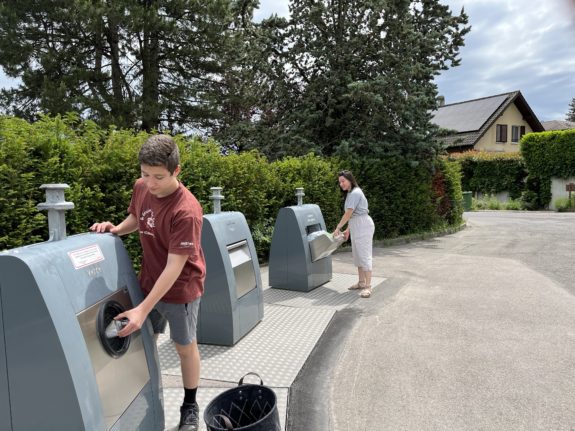When Nadiia, 23, and her brother Roman, 16, left their home, mom and older brother in the city of Odessa, all they knew about Switzerland was that it was beautiful, clean and safe.
After arriving, they say they were not wrong on that score.
Their first impression when they arrived in mid-April was “amazing views, beautiful towns and villages”, Nadiia recalls.
As they got to know their surroundings in the Lake Geneva region, they made even more discoveries. Roman, for instance, was impressed by the state of Swiss roads and how the narrow ones could accommodate two-way traffic.
He also likes that most roads have bicycle lanes.
One advantage of seeing things with a fresh set of eyes is noticing seemingly trivial things that those of us living here don’t pay attention to and mostly take for granted.
Roman mentioned that there is no difference, in terms of infrastructure, between towns and countryside. How many of us have made this astute observation?
And Nadiia commented on the abundance of fountains that spout clean, drinkable water.
READ MORE: Ten things Geneva residents take for granted
Last but not least, and unlike many other foreigners who find the Swiss aloof, Nadiia and Roman’s experience has been the opposite.
All the people they’ve met so far have been “nice, friendly, kind, and helping us integrate”, Nadiia said.
Bottles, paper, batteries
Among their most surprising discoveries (aside from the ones mentioned above) was Switzerland’s recycling system.
Coming from a country where “everything is stuffed together in a bag and thrown into trash” — as Roman described his nation’s approach to recycling — the Swiss way of disposing of waste was a real eye-opener.
The two took to the new ‘recycling culture’ quickly and willingly, hauling household garbage to nearby bins and separating paper, cardboard, plastic and glass bottles, organic waste, and Nespresso coffee capsules more assiduously than we do.

Roman and Nadiia are equal to the (recycling) task. Photo: Helena Bachmann/The Local
“Easier life”
Both siblings like to cook, which we embraced with enthusiasm and gratitude.
We have been the lucky recipients of Ukrainian specialties such as borstch (a beet-based soup), as well as pelmeni and vareniki — round or crescent-shaped dumplings stuffed with ground meat or potatoes, respectively.
Needless to say — and that is a rare thing in our house — everything is made from scratch: beets, cabbage and carrots for the borstch are grated by hand, and the dough is made and kneaded manually as well.
When I pointed out that all the ingredients — such as grated beets and dough can be purchased pre-made, and that people in Switzerland usually don’t spend so much time in the kitchen, the two conceded that life here “is easier” as there are fewer domestic chores to do, but they still prefer the traditional, more laborious way of food preparation.
Prices and bureaucracy
In their six weeks here, the two have noticed some negative aspects of Swiss life as well.
The biggest shock — as is the case for most new arrivals — are the prices.
EXPLAINED: Why is Switzerland so expensive?
On the day after they arrived in Vaud, Roman was stunned that a loaf of bread we bought cost 3 francs, while the same one sells for the equivalent of 50 cents in Ukraine. Cost of other consumer goods has been a shock as well, though they now begin to grasp that Ukrainian prices and wages can’t be extrapolated into Swiss ones.
Another thing the siblings don’t like so much is that shops close by 6:30 pm on most days, after which time there is not much to do, especially in the small town where we live.
Nadiia also mentioned how slow the Swiss bureaucracy is.
While the two received their status S — which allows them and other Ukrainian refugees to stay in Switzerland for a year — relatively quickly, the cantonal procedures related to integration and French language courses take much longer.
Switzerland’s special ‘S permit’ visa program: What Ukrainians need to know
However, they understand this slowness is due to the large number of Ukrainians that are currently here — more than 3,500 in Vaud as at beginning of May — who have to be processed as well.
The sheer number of people who have sought refuge in the canton in a short period of time is an unprecedented situation for all the services and departments dealing with these refugees, so delays are par for the course.
Oh yes, another important perk…
Among Roman’s personal Swiss-life favourites is the one allowing those over the age of 16 to drink some alcoholic beverages, while the legal drinking age in Ukraine is 18.
So far he only had one beer, but it’s good to know Switzerland’s charms go well beyond chocolate and edelweiss.



 Please whitelist us to continue reading.
Please whitelist us to continue reading.
Member comments